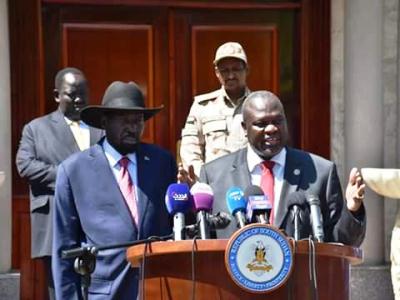Rights body criticizes South Sudanese leaders for ignoring justice mechanisms
June 7, 2016 (JUBA) – A United States-based human rights body has criticized South Sudanese leaders of bypassing justice in the country in favor of a truth-telling exercise.

But Human Rights Watch, in a statement, said this new proposal backtracks on the leaders’ previous commitment to ensure a hybrid court was created by the African Union.
“By objecting to trials, South Sudan’s leaders, Salva Kiir and Riek Machar, have put their own interests above those of their people. Their proposal to scrap trials is a self-serving attempt to evade justice at the expense of victims of atrocities, which can only be expected to fuel further abuses,” said Elise Keppler, an international justice associate director at Human Rights Watch.
According to the official, the August 2015 peace agreement endows the African Union, not these leaders, with the responsibility to set up an African-South Sudanese hybrid court to try perpetrators of the worst crimes.
“The AU should set aside the self-interested objections of men implicated in grave crimes and instead assist the victims by moving forward with justice,” added Keppler.
South Sudan, the world’s youngest nation, experienced over 20 months of a bloody conflict and by its end, tens of thousands had been killed and over 2 million displaced.
The two leaders, however, said they were committed to ensure that the young nation does not go back to civil war.
“After a peace agreement signed in August 2015, we have come together as brothers once more in government, as president and first vice president. Even with our differences — in fact, because of them — we are determined to reconcile our communities and create unity,” they wrote.
Both Kiir and Machar advocated for an “organized” peace and reconciliation process with international backing.
Such a process, they said, would ensure everyone in South Sudan is engage through dialogue, and by so doing affirm the truth of what happened during our bloody civil war.
They said, “We intend to create a national truth and reconciliation commission modeled on those of South Africa and Northern Ireland. This commission would have wide-ranging powers to investigate and interview the people of South Sudan, from the poorest farmer to the most powerful politician, to compile a true account of events during the war.
The two leaders, in their article, said those who tell the truth about what they saw or did would be granted amnesty from prosecution, even if they did not express remorse.
Both leaders called on the international community, the US and Britain in particular, to reconsider one element of the peace agreement to which they are cosignatories: support for a planned international tribunal, the Hybrid Court for the world’s youngest nation.
“We call on them instead to commit to global backing for a mediated peace, truth and reconciliation process,” they wrote in the joint article published on 7 June.
(ST)
